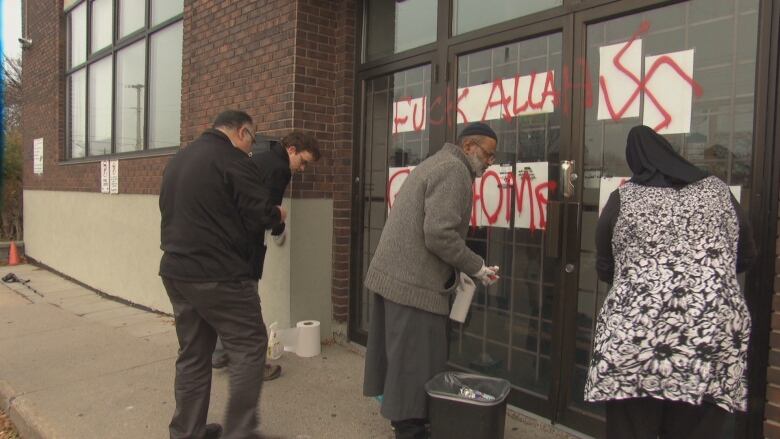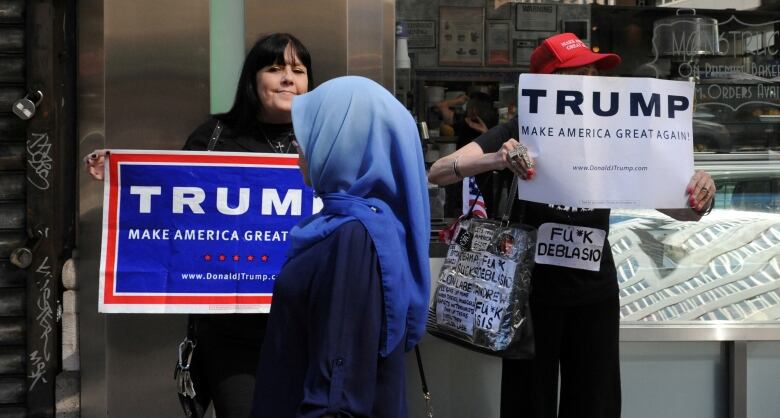Minority groups are seeing one of their greatest fears come true they're becoming targets at home
Disorganized acts of harassment and intimidation can be precursors to hate crimes

Our society is suffering from an alarming disconnect: minority groups in Canada and the U.S. are sharing their experiences of being targeted or intimidated by bigots, yet their testimonies in news reports are drawing the ire of critics. How on earth did we get here?
It's in the comment sections of every online news source people expressing their fatigue with stories about intolerance. Take this one, below a story about racist incidents in Canada following Donald Trump's election win: "Any time someone expresses there [sic] opinion about refugees and immigrants in this county [sic] you have to be a racist. I'm so sick of that card being played."
That comment garnered almost 200 "likes."
It's not just anonymous complaints, though. Writing in the Toronto Sun, columnist Tarek Fatah dismissed legitimate upset over a Markham, Ont. principal's anti-Muslim Facebook posts as nothing but a "witch hunt." Toronto Sun columnist Joe Warmington shrugged off warnings by political commentator Van Jones about Nazi salutes following Trump's win as musings by a "sore loser."
Fears coming true
Minorities, by nature, are sensitive about being exploited, standing out or being excluded. For years, they've endured thinly veiled phobic rants, masked under diatribes about the war on drugs and the war on terrorism. More recently, they've grappled with xenophobic urgings from political leaders: Trump threatening to build a wall, deport Muslims, bring back stop-and-frisk (which usually targets blacks) and so forth. Here in Canada, Conservative leadership contender Kellie Leitch captured headlines by stoking fears about improper screening of immigrants.
Now, these groups of people arewatching their greatest fear come actually true: they're becoming targets on buses, university campuses, in banks andin their homes, unlike they've experienced in a generation. Over the past several weeks alone, a woman was verbally accosted in a Toronto bank by a man making racist taunts. The bank did little to help her. A man carrying a noose threatened women wearing hijabs at an Edmonton LRT station. Swastikas were spray-painted on synagogues in Ottawa, and racist tags were spotted in an alleyway in Regina, upsetting local residents.
Yet some observers look at reports of what's happening as well as at the heightened awareness about racism, anti-Semitism and Islamophobia and describe that as people being hypersensitive. What?

In February, a study published in the journal Studies in Conflict & Terrorism described a right-wing extremist movement existing in Canada. Some members, it found, pose a very real public threat of carrying out random acts of violence, while others specifically target their attacks to Muslims, Jews, people of colour, aboriginals and LGBTQ people.
Lately, what has minority groups in Canada feeling unsafe is the unpredictable nature of such occurrences. According to Barbara Perry, a criminology professor and lead author of the study, no one knows when a right wing extremist will "lash out." Knowing this, who could possibly blame minorities for feeling "hypersensitive?"
It's arguably worse down south. According to U.S. Attorney General Loretta Lynch, FBI statistics for 2015 showed a six per cent increase in reported hate crimes. Victims included Jewish people, African Americans and LGBTQ individuals. Hate crimes against Muslim Americans increased 67 per cent.

We in Canada should heed these signs. Ideologies that incite hate crimes easily transcend borders, especially when they're laid out online or given free air time by the news media. What we're now witnessing here are disorganized acts of harassment and intimidation directed at members of these groups a precursor to hate crimes if we don't discuss plans of action to keep everyone safe.
Time to speak out
A great many Canadians certainly don't condone these treatments of their fellow citizens. Kindness and empathy are interwoven in our Canadian fabric. But when we don't actually speak out against the targeting of minorities whether it's taunts, intimidation or harassment the people feeling attacked can't differentiate between their supporters and their attackers.
Minority groups are absolutely justified in feeling that their safety is being threatened. Rather than dismiss the concerns of minorities now, other Canadians should consider rallying behind their desire to feel safe and secure.
This column is anopinion. For more information about our commentary section, please read thiseditor'sblogandour FAQ.












_(720p).jpg)


 OFFICIAL HD MUSIC VIDEO.jpg)
.jpg)



























































































